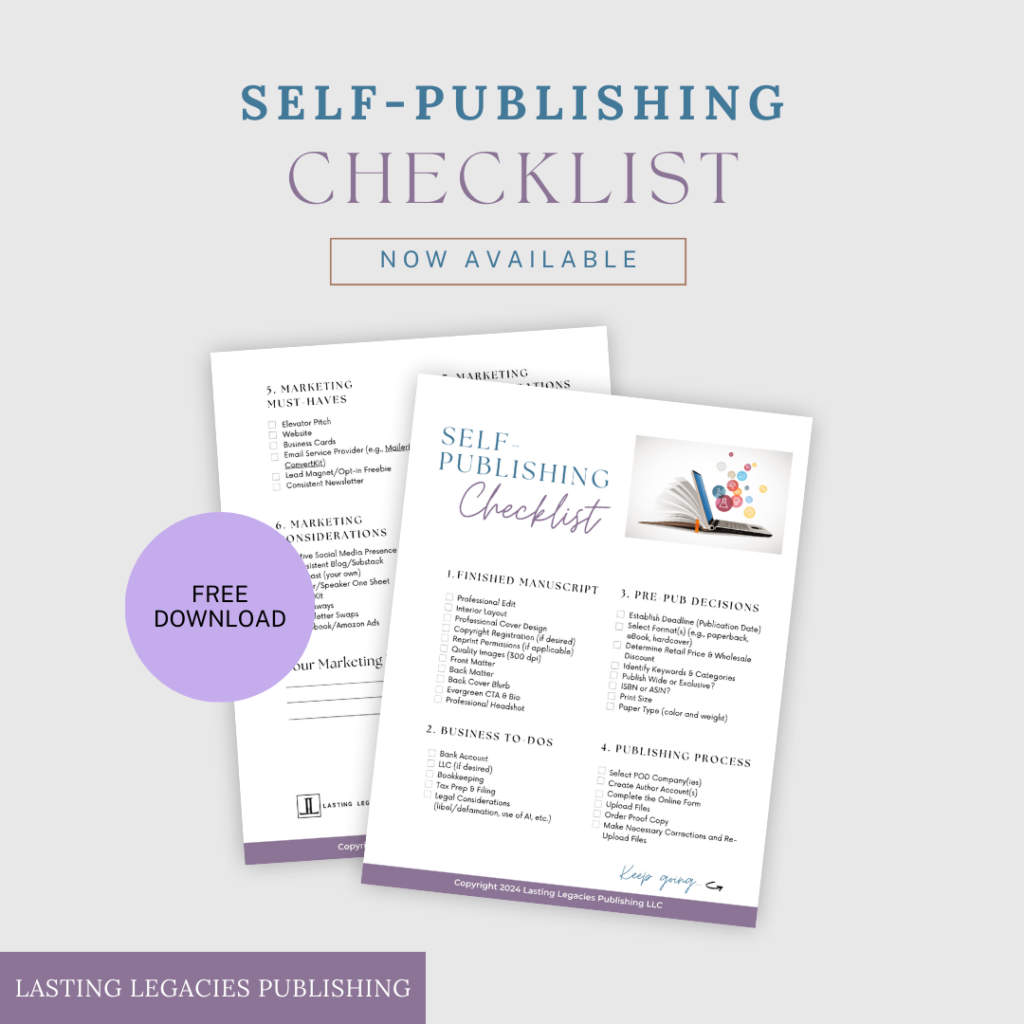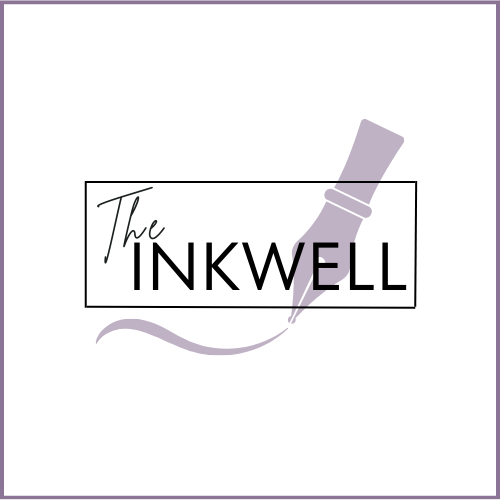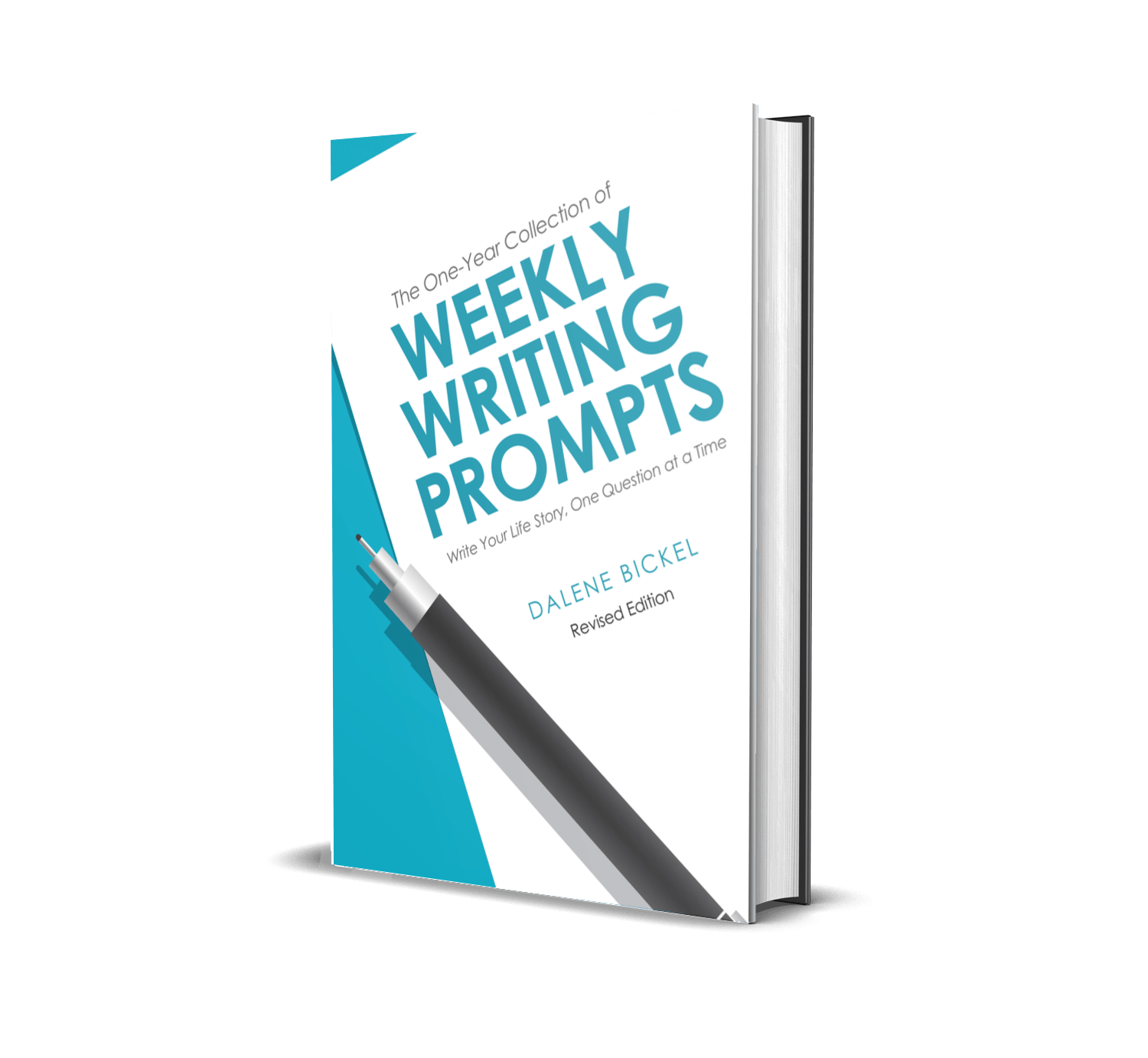LISTEN
READ
Welcome back to another episode of the Ink and Impact Podcast. Today I’m going to be discussing something that everyone else seems to be talking about these days, and I really debated about whether I should make an episode to join in the crowd, but I really had a conviction to look into AI and to share the pros and the cons.
I feel that so many people are only talking about the pros of AI, and that’s not to say that you should never use AI in your writing. That’s not what I’m saying at all. I just think that we should go in with our eyes wide open and having done some research about what all is involved and some of the risks that are involved as well.
AI is everywhere and has been used to varying degrees for years. Now we’ve got audio transcription, social media algorithms, Alexa and Siri smartphones. Google. And it’s been used in virtually every conceivable occupational field, medical, automotive, banking, education, construction, and yes, publishing.
But while AI has been around for some time, it’s primarily been used by businesses and organizations. The latest iterations make it accessible to everyone. And when you open up advanced technology to the masses, things can go awry without proper precautions in place.
Back in October, my youngest son was invited to attend a conference about AI and cybersecurity, and interestingly, the conference title was, “Should We Hack Humanity?”
Now, that’s an attention-grabbing headline, isn’t it?
So as someone who had never looked into AI before, never even really thought about how the Google searches came about or how the algorithms work, I never really thought about it until they made us think about it, and oh boy, there was a lot of insight.
My eyes were opened to the good, the bad, and the ugly of AI.
There were several speakers at the conference. One had helped to develop Alexa, one worked in the medical field, and one worked in the political arena. It is amazing how much AI is used in all of those areas in ways that we as consumers and citizens are unaware.
And yes, they confirmed you are being listened to all the time on your phones. Isn’t that just lovely?
But anyway, today I want to talk specifically about the publishing industry because all of you are writers or in the publishing industry in some capacity. I wanted to really dig into this because I personally felt a bit convicted.
Everybody else seems to be so excited about it and diving into it and touting all the benefits, and I have a little hesitation about it. Not that I don’t think that it should be used, but that we should just be aware of how to properly use it and be aware of all of its limitations as well. So today I’m going to share six different downsides to AI.
Now, I’m sure these aren’t exhaustive; it’s just my personal research and opinions.
#1 Over-Reliance
This is just something that I am thinking about – how people can become over-reliant on it. You know, everyone is saying that AI can’t replace a human brain, but if we’re not careful, the more we begin to rely on its efficiency and, dare I say, become addicted to the ease and the simplification of it, the more often we’ll be willing to turn to it and accept subpar quality as the standard.
#2 Limited Free Service
Some of the most popular apps out there right now are offering free trials during their test phasing, and then they plan to charge for the use of their service, which, you know, I would imagine is very expensive for them to be creating this technology.
It’s a lot of time, a lot of effort for their developers plus the software, all of that. So I can understand why they will need to charge down the road, but I think many people might start using it now when it’s free, and then get so reliant on it. Remember that point number one? Then they are just more apt to pay for it later rather than using their brain more than digging into their wallet.
So what does it cost? Chat GPT, for example, is going to charge per a thousand tokens, which is roughly 750 words. It’s interesting. Each of these apps use different terminology – a different language – so they are charging per thousand tokens, and that equates to about 750 words, and one website suggested that it all equates to roughly $20 a month.
Okay, that’s not super expensive, but you know, it’s still a fee. So one of its competitors, Jasper, starts at $24 a month after their free trial. And then there are those that follow a pay-as-you-grow model. So Copy AI allows 2,000 words a month for free. However, as you probably know, 2,000 words can be generated pretty quickly. I mean, that’s just the equivalent of about two longform blog posts. So if you write more than that a month, plan to pay $36 a month at Copy AI.
Now Rytr.me allows you to generate up to 10,000 characters a month for free, and that’s about the equivalent of 1,000 words. Then they charge $9 a month for up to 100,000 words, or $29 a month for unlimited words.
I’m sure there are many other AI writing generators out there, but you just want to be aware that there are limits to the free version, and then you will have to start paying. So be sure when you’re researching different apps or technologies, I’m not even sure what they call it. I’m calling it an app. I might be wrong there, but be sure to check out their pricing policies.
#3 Unethical Usage
Unethical behavior happens every day in every. It won’t be any different in the writing and publishing industry.
There was an ad that I saw in my Instagram feed and it was startling. It was actually the worst-case scenario, in my opinion, because they were promoting, “Hey, come to our site and let AI generate your cover, your outline, and all of your chapters!”
So basically have AI write your entire book for you, and they were touting how quickly it will happen and how you can become a published author in one day and just all of these quick-and-easy claims.
But is your book going to be good? It’s definitely not going to have your voice, your language, your insights, your experiences.
So yes, you can run out of the gate and come across the finish line in first place. But did you cut through the infield to get there?
Do we really want to do that as Christian writers? I hope not.
I’m not sure if it’s universities or high schools, but certain schools have banned AI like Chat GPT and some of these programs from their students’ laptops because they know that, hey, students are gonna cheat.
Not every student, obviously, but enough to cause a problem, right? I mean, there were the CliffsNotes when I was growing up and teachers didn’t want us using those. And this is even more invasive, if you want to call it that.
There was another headline – I didn’t click on the article to read it – but I saw the title of the headline from The Verge, “AI Generated Fiction is flooding literary magazines, but not fooling anyone.”
I think that’s interesting and that right now that’s true. It’s another reason why I don’t think you want to have a completely AI-generated book; people see through it as that. But you know, they say that the AI is trained by humans and it will keep improving, and so it might improve to the point that it will start fooling some people (not everyone).
But there’s that issue of ethics: are we working to the benefit of ourselves or to honor God? Are we doing things to cut corners or are we doing things to provide information and to relate to our readers?
That’s a decision only you can make.
#4 Inaccurate Results
I don’t know if you’ve heard that Google recently launched their version of AI to compete with Chat GPT, and it’s called Google Bard. I went to their landing page to learn more about it, and I thought it was interesting – there’s a waiting list to even try it. I couldn’t give it a try right now to let you know what happened.
But on the landing page, it warns and I’m quoting: “Bard is an experiment and may give inaccurate or inappropriate responses.”
Do you really want to use that kind of inaccurate material in your books?
There was an article that I did read at PublishingPerspectives.com titled, “What AI Isn’t: An Interview with Thomas Cox on Chat GPT” by Porter Anderson.
I am going to read a couple of quotes from that article:
“Cox talks about how the software can ‘hallucinate,’ as technologists call it, generating a stream of authoritative sounding verbiage that’s, in fact, utterly wrong. ‘Which is to say it will lie to you,’ Cox says ‘Like, it’s the truth. Because it has no idea that it’s not the truth.’”
Interesting. And kind of scary.
The article goes on and I love how it points out that the name itself – “AI” or artificial intelligence – is fake. It’s not real.
But anyway, the article says, and I quote, “This is not actually intelligence. There is no known sentience in any ‘AI’ system. The ‘AI’s,’ as they’re called, are not self-aware and they ‘know’ nothing.”
They’re machine learning. And then it says “The machine plunders existing texts, searching for matches to a phrase, without consciousness or context.”
So to me, it’s just another proof that God made us unique and our minds are incredibly complex organs that compute information and reason better than any machine ever can. Let’s use that reasoning factor when utilizing technology, especially.
#5 Time Consuming
I was listening to a podcast and one author shared that they spent hours over a series of days working to get the AI bot to generate something along the lines of what they needed.
Okay, so this is my personal opinion, but that time might have been better spent simply honing their craft by using their own mental muscle than typing in all kinds of key phrases and keywords, trying to get the right fit, the right look, the right sound.
Of course, the argument is that once AI is trained, it will from then on provide much more reliable data. But will this simply lead to the other problem of over-reliance that I already spoke about? Time will tell.
#6 Potential Loss of Your Privacy and Rights
This is the one that really has me concerned, especially when I learned that The Author’s Guild now has a contract clause to protect the authors, denying publishers and platforms the ability to use their copyrighted works for AI training purposes.
I don’t know if you’ve done any research or ever wondered how or what exactly is training the AIs, but people are training it. And with what? With other people’s written words.
That’s right. Sometimes publishers give their authors’ books to these AI companies to use to generate information.
So whenever the algorithms are working behind the scenes to create a response to what you’re asking on these writing generator sites, it’ll pull from other people’s written works – famous ones like Shakespeare and Tolstoy and all those others (pick an author), but also from recent works.
Imagine if you were unaware that your book – your intellectual property – was being put out there to be used and regenerated in various ways. Maybe a phrase or a couple words here and there that you created and own, but are now being given to other people to use.
It’s a real issue about copyrights and author rights and plagiarism and all of that.
I was in a mentorship/mastermind group and the topic of AI came up and everyone seemed to be really excited about it, but I posed a question, and of course as authors, no one knew the answer, including myself.
Some writers I know are uploading anything from a couple words or an outline the whole way up to a chapter of their book to see how AI can flesh it out and make it better. So if you’re uploading a chapter of your book, what happens to that information?
They [the AI writing generator] now has it. Who owns the copyright once you upload that text? Is it still yours? Is it theirs? Is it no one’s? Will they then use that information to train their system on the backend?
That’s where you need to really look at not only the pricing when you’re looking at these sites, but also their privacy policies.
I’d heard about an AI system for podcasting, and I was really interested because creating the podcast titles are hard for me. And then finding the time to create the show notes and the descriptions and all the social media posts. It’s a lot of work so this AI system – it’s very enticing.
I was curious, but I wasn’t just going to jump into the free trial. I looked for a privacy policy and I didn’t see any, but they offered an email. So I sent a message and they responded right back, saying my questions were valid and that it was definitely time for them to post their privacy policies on their website.
I just wanted to make you aware that you should – like with anything – always read the fine print. A lot of us don’t want to take the time to read the fine print, and a lot of it we don’t really understand anyway. But I really encourage you to do that, especially with brand-new technology.
- What are you potentially giving away as far as your rights?
- What are you able to keep?
- What are they going to do with that information?
This doesn’t just apply to written word, either. If you’re doing audio books, this can apply to you, too. I found a headline for an article on Wired.com titled, “Audiobook Narrators Fear Apple Used Their Voices to Train AI.”
So now we’re not even just talking about the written word, but also our voices – our voices – are being used to generate someone else’s audiobook or to create a new voice; that kind of thing.
It’s kind of crazy, but it is important to think about.
Pause and Process
All right, I am going to stop there with those six and just summarize by saying that my concern is that AI might cause us to no longer pause and process and do the necessary hard brain work that it comes to become better writers.
It’s hard to write a book; it’s hard to consistently write a blog post. But it is so good for our brains and it helps us become clearer in our message, in our overall branding, everything. It comes from hard work.
So much of society today wants or expects everything to be easy and fast. Maybe you’ve heard that term, “microwave society.” You know, we just wanat to push a button and “Boop!” there it is.
But I think it’s to the detriment of our attention spans and our critical thinking skills. You know, there’s a lot of debate about social media right now, about how much time we’re on it and how invasive it is in our lives and how people are addicted to it.
And while I don’t spend all day on my phone or on the apps, I do spend a fair amount there because I’m trying to market and engage with followers and build relationships and do all of those important things. But we need to limit our time on those as well.
I’m saying all that because I have been recently editing a book for a client, and I am having a hard time staying really laser focused on editing for longer than a 20-minute period at a time. It used to be I could really focus for an hour or more on a task, and now I’m like, “Oh, it’s been 20 minutes. Time to get up and do something, or time to look at something else, or time to push at a button.” And so if I notice that in myself, I’m sure that it’s happening across the board.
We don’t want to lose our attention spans.
We don’t want to lose our critical thinking skills (any more than we already have – our attention spans are now even less than a goldfish. It went from seven seconds down to three seconds or something crazy like that. Don’t quote me on that, but I know it’s under 10 seconds, which is not very long.).
Call me old fashioned, or a contrarian, or as my grandmother used to say, a “fuddy duddy.” But I urge us to be cautious and not jump headlong into the waters without carefully testing it out first.
Application
So am I using AI? Yes. Even if I didn’t want to, it’s almost impossible not to because it’s so prevalent in everything that we use these days.
And am I going to use it for some writing like I had mentioned, you know, for podcast titles and show notes? Yes. That would be great.
But I’m not going to give it so much of my … I’m not going to feed it everything that I’m doing (like full chapters) … or at least that’s not my intention at this time.
Maybe I’ll change my mind. Who knows? But for right now, I’m playing it safe, I’m playing it cautious, and I’m not saying that you’re wrong to do use it. If you feel led to do that, that’s perfectly fine. I just urge you to be cautious and to be aware.
In conclusion, time will tell if our modern society’s desire for instant gratification will lead to widespread, unintended, and undesired consequences. Are we willing to trade the long-term benefits of hard work for the short-term success that comes from convenience?
After all, in the end, the question we will each be asked, won’t be, “What did you do with technology?” but instead, “What did you do with my son, Jesus?”
What do you think?
I would love to hear your feedback about this episode – or any other episode!
Let’s have some dialogue. If you disagree with me, that’s fantastic. I’d love to hear what your thoughts are. I’d love to learn even more about it
Please email me at info@inkandimpact.com or DM me on Instagram. That’s the platform that I spend most of my time on social.
That’s it for today, fellow pen pusher. Remember, don’t just write a book. Make an impact.
The Inkwell Collective
Have you signed up for the new Inkwell Collective yet?
There’s a free general membership to test the waters to connect with other writers. Ask your questions, share your successes, ask for prayer. In addition, once a month we have a free writing session at the Inkwell via Zoom and that’s at 10am Eastern Time and 2pm Eastern Time. You’re free to take advantage of both of those sessions on the second Wednesday of every month, so be sure to check that out!
Again, the basic membership is free, and you can upgrade for a very low monthly price to get weekly writing sessions plus access to the monthly q&a craft chat. This past month, we had a great discussion on the q&a about plagiarism, grifter, reprints, and copyright issues. So there was a lot of really good information that was shared and discussed. Each month we’re going to discuss a different topic. Everything is recorded for the paid members to go back and review at their leisure if they’re not able to join live.
Join the Inkwell Collective. On this landing page, you will see a video tutorial so you get to see actually what it looks like inside. Remember, you can join for free to get a feel for it and see if you like it!
Come get connected with other Christian writers who don’t just support each other, but also encourage each other and grow in the Lord together.
Did you find this episode helpful?
If so, I would be ever so grateful if you’d spread the word about this podcast. I know there are many Christian writers out there, and I’d love to help support as many of them as I can, wherever they are in the world!
How to do that?
On Spotify, simply go to one of the episodes and click the share icon. You’ll then see that you can copy the episode link or share directly into a multitude of social media platforms.
I’m sure it’s similar on Apple – sorry, I’m an Android user.
Or, when sending emails or talking with other writers, simply direct them to inkandimpact.com
Thank you for your support, and I look forward to sharing more with you next week!
Related Episodes
EPISODE 34 – Your Leadership Role as a Writer
EPISODE 14 – Your Identity and Influence as a Christian Writer
EPISODE 2 – Are You Focusing on the Right Thing?







0 Comments